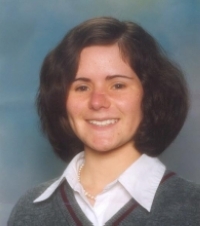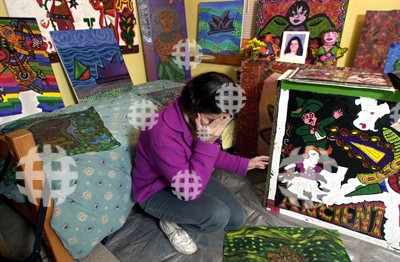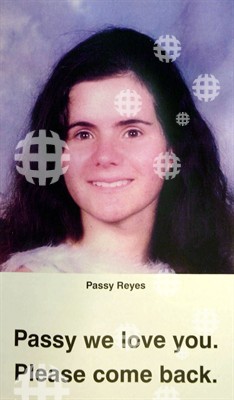
Passy, her mother and brother who still miss her terribly.
Podcast from NSW Police - - https://podcasts.apple.com/au/podcast/ep-1-passy-reyes/id1524599320?i=1000488089612
| Passy REYES | |||||
| DOB: | 1983 - 18 years when missing
|
||||
| HAIR: | Brown | BUILD: | Thin 156cm tall | EYES: | Brown |
| CIRCUMSTANCES: | |||||
| Passy Reyes was last seen at Mona Vale, Sydney on 18 July 2001. She had been living and attending school in the district. Passy is believed to have left her home at approximately 4.50am that morning and has not been seen since. There are grave concerns for her safety and welfare. | |||||
| Reported missing to: Dee Why
Police Station. |
|||||
ARCHIVES - August 14, 2003 |
||
|


AUGUST 2, 2001 : Margaret Reyes mother of missing girl Passy Reyes in Passy's room, 02/08/01 with all her major art works for the 2001 HSC. Passy has been missing since 18/07/01 after leaving family home in Mona Vale in Sydney
**If Passy's family has the originals of these photos please send them to me.
If requested to, I will remove them but they are ONLY here to help in the appeal for Passy's return home.
Sydney Morning Herald 30/07/2001
=
Student
was tormented by HSC
(Sydney Morning Herald)
Passy Reyes spent hours in her bedroom painting, inspired by imagery from the country of her birth, Mexico, and Australia, where she was raised. The Pittwater High School student disappeared last week.
Passy was a great swimmer - http://www.avalonbilgolaswimming.asn.au/perpetual_trophies.html
Passy Reyes was 18 when she vanished from Mona Vale 19 years ago — now police are using a podcast to help crack the cold case mystery.
Cold case cops have created their own dramatic podcast to help crack a decades’ old missing person mystery on the northern beaches.
In episode one of a series by the NSW Police State Crime Command, the chilling disappearance of an 18-year-old HSC student from Mona Vale is examined in detail.
Detectives are hoping the professionally produced podcast may spark a hidden memory in people who may know something about how Passy Reyes vanished in the early hours of July 18, 2001.
In the podcast Passy’s mother Margaret and her brother Chris relive the dark days when she disappeared after leaving their Barrenjoey Rd duplex at 4.45am. She was never seen by them again.
The podcast asks: Was she a run-a-way or did she plan a getaway to escape her old life?
Ms Reyes still believes, 19 years on, that her beautiful daughter is still alive.
Detective Sergeant Jason Ferns also reveals insights into how police, at the time and now, are trying to solve the mystery.
In 2001, Mexican-born Passy was studying for the HSC at Pittwater High School at Mona Vale. Ms Reyes, a widow, said Passy was feeling the strain of completing artworks for the end of year assessment and studying for her final exams.
On July 18, it is believed that Passy put on a dress she had picked out for her upcoming Year 12 formal and walked to nearby Mona Vale Beach.
A bus driver, doing an early run into the city, told police he saw a young woman matching Passy’s description, and wearing the blue-green formal dress, walking in the gutter along Barrenjoey Rd.
Later that day her neatly folded dress was found on steps leading down to Basin Beach at Mona Vale.
An extensive police search of the ocean and the local area, including Mona Vale Headland, failed to find any trace of the teenager.
In the weeks after her disappearance there were reported sightings of Passy walking on Pittwater Rd at Narrabeen as well as at Bondi Beach and Darlinghurst.
An electrician from Dee Why swore to police that he saw Passy in a cake shop at Kings Cross two months after she was reported missing.
The family never gave up the search, even travelling to Mexico in case Passy had travelled there to reconnect with her dead father’s family.
Sgt Ferns says in the podcast that while police are keeping an open mind, the likelihood is that the young woman took her own life.
But he said there was still a possibility that she is alive and simply does not want to be found or that she went swimming at Basin Beach and drowned.
Ms Reyes tells the podcast that her intelligent daughter was capable of planning “her getaway”.
But she still pleads with her to come home.
“She is scared of what we will say,” Ms Reyes said. “You need to have a lot of courage to go and you need a lot of courage to come back because we will ask ‘why?”
A tearful Ms Reyes makes a heartfelt plea to see her daughter once more.
“Passy, I love you very much.
“Where ever you are, it’s all right.
“When ever you are ready to see me, to see your brother, we welcome you with open arms.
“Every day is a new day and a new hope to see you, for you to be with us, to give you a good hug and be close again, together.
“There is no day that I don’t think about you.”.
Police say that since January 2019, there has been 38 long-term missing teenager cases in NSW.
If you can help, contact Crime Stoppers on 1800 333 000.
The podcast is streaming now on:
Apple: https://apple.co/3iRmwYX
Spotify: https://spoti.fi/3gXGkZN
A POLICE podcast about missing northern beaches teenager Passy Reyes has
already attracted one lead, but cold case cops are looking for more.
Passy, then 18, was a Pittwater High School student who was studying for her HSC when she walked out of her Mona Vale home in the early hours of July 18, 2001, and disappeared.
Detectives involved in her case are hoping the podcast will spark memories among people who might know something and be holding a vital clue without even realising it.
The podcast aired in mid August and not long after a call was made to
police.
"It generated a lead, it was one enquiry, but it really didn't shed any light on that disappearance," Northern Beaches Police crime manager Detective Inspector Michael Boutouridis said.
"We're looking for any information, even if it's seems insignificant by whoever has it. You never impact it could have. It could be the little thread that we pull and it just opens up everything."
Passy walked out of her Barrenjoey Road duplex that she shared with her mother Margaret and brother Thomas at 4.30am.
A bus driver reported a sighting of her at 4.45am on Barrenjoey Road, near the intersection of Bassett Street, which was just 500 metres away from her home.
Passy's formal dress, which was a floral silk dress in yellow, green and blue with a split up the side, was later found neatly folded and on the steps leading down to Basin Beach at Mona Vale. This was just 700m from her home.
Despite several possible sightings of Passy, there has been no confirmed contact.
Speaking on the podcast, Margaret said believes her daughter is still alive.
"She's capable of planning her getaway," she said. "I have not given up hope and that's kept me strong."
If anything leans towards a suspected death we're obliged to report it to the coroner.
Northern Beaches Police crime manager Detective Inspector Michael Boutouridis
Like other missing people, police keep DNA records on file to compare at a later date if required. In Passy's case, officers have mitochondrial DNA (it's passed from mother to her children) from Margaret.
Det Insp Boutouridis said tragically there are other missing people from the
northern beaches and that police remain committed to finding every single
one.
"The cases always remain open and we understand how important they are to loved ones who are left with this gap, this void in their family," he said.
"If anything leans towards a suspected death we're obliged to report it to
the coroner."
This is what happened in the Lynette Dawson case, with her husband Chris Dawson, 72, now on trial for her murder. He has pleaded not guilty and the case remains before the courts.
In the case of Passy, Det Insp Boutouridis said police do not suspect foul
play and there has been no "definitive evidence of suicide".
For those families who are left behind, he said police will continue to work to find answers.
Anyone with information which may assist in locating the whereabouts of Passy or any other missing person is urged to call Crime Stoppers on 1800 333 000.